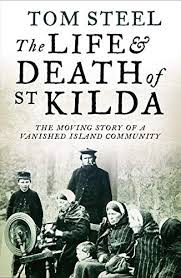The Life & Death of St. Kilda: The Moving Story of a Vanished Island Community
The
blurb at the back of this book by Tom Steel says, “The story of St. Kilda has seized the
imagination of people worldwide.” But I had never heard of this island before I
found this book while on vacation on the Isle of Skye, Scotland.
St. Kilda is a
group of the outermost islands of the Hebrides, 40 miles (64 km) west-northwest of the nearest island of the Outer Hebrides, North Uist, which is a 2½-hour
boat trip today.
The islands are
home to a variety of sea birds, including the world’s largest colony of
gannets, as well as two types of wild sheep. It was in this extremely remote,
small area that a community of people lived for at least 2000 years. They
existed mainly on the meat and eggs of the sea birds and lived in a row of
stone houses along one “street” on Hirta, the largest island of the group.
There
was little interaction between Hirta and the rest of the world, except for the British
postal service and a government-supplied nurse. In 1930, the last nurse sent to
the island eventually convinced the inhabitants to move to the Scottish
mainland. At the time of the evacuation, there were fewer than 100 people
living there. This book details that evacuation and the subsequent experiences
of the islanders in their new homes, but most of the book is a description of
life on St. Kilda.
The
author provides extensive descriptions of how the inhabitants survived and what
their community was like. The information is detailed and fascinating; it is
amazing that people who were part of Great Britain could have lived such
isolated and primitive lives for so long. Tom Steel’s account does romanticize
that life to a great extent. His focus throughout the book is that something
precious was lost when life on St. Kilda came to an end. However, the changes
he writes about indicate that the islanders were no longer able to be
self-sufficient and needed direct support from the government. It seems the
government decided that the people would be better served by living in mainland
Scotland. Tom Steel sees this as the negative influence of capitalism. As he
writes in the Introduction:
“In terms of Great Britain, the
Highlands and Islands of Scotland have been sacrificed in order to advance
civilization. The story of the life and death of St. Kilda is perhaps more
pertinent today than it has ever been. Our industrial society has forced people
to contract relationships with each other on the basis of money. Money is what
binds individuals together and fixes the relationships they have with each
other. Opulence in the modern western world has become the yardstick of human
happiness and it has been widely accepted that men should always strive in
search of economic wealth unless ignorance, poverty, or sheer habit prevent
them from doing so.”
After
reading the book, I’m not sure that I agree with this view of the reason for
St. Kilda’s evacuation. A small group of people could no longer sustain
themselves where they were living, and the government supported them to move to
another area where they could. It is not clear to what extent the islanders
were ‘forced’ to leave. Part of the tragedy of the St. Kilda evacuation was
that even though the islanders agreed with the reasons for the move, they had no
idea of the incredible adjustment that would entail.
Of course, that adjustment was huge. Not only were they not used to streets, vehicles, buildings, crowds, but they were also not used to a life based on money to buy things, rather than barter items they made themselves. From the information given in the book, it would seem that they did not get much social or psychological support after the evacuation. Jobs and accommodations were found for them, but they no longer had the support of their tight-knit community and the only way of life they ever knew. So it is not surprising that all the islanders mentioned in the book missed their home and felt – in the words of one of the evacuees – “It was a far better place.”

I’m quite intrigued by this, thanks for sharing
ReplyDeleteFinding information like this is one of the many reasons I enjoy reading non-fiction! Thank you for your feedback.
ReplyDelete